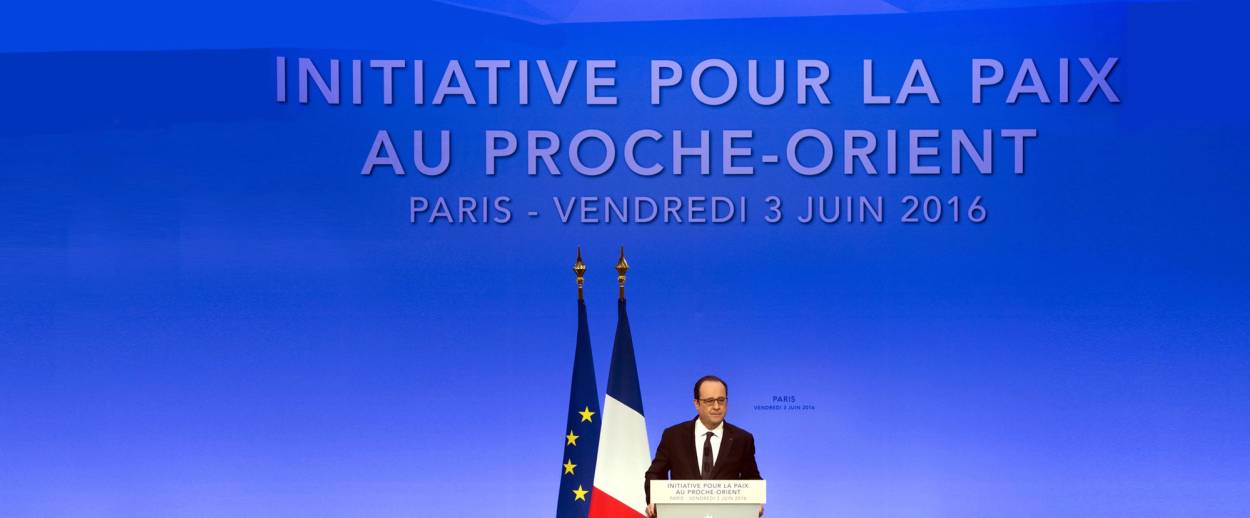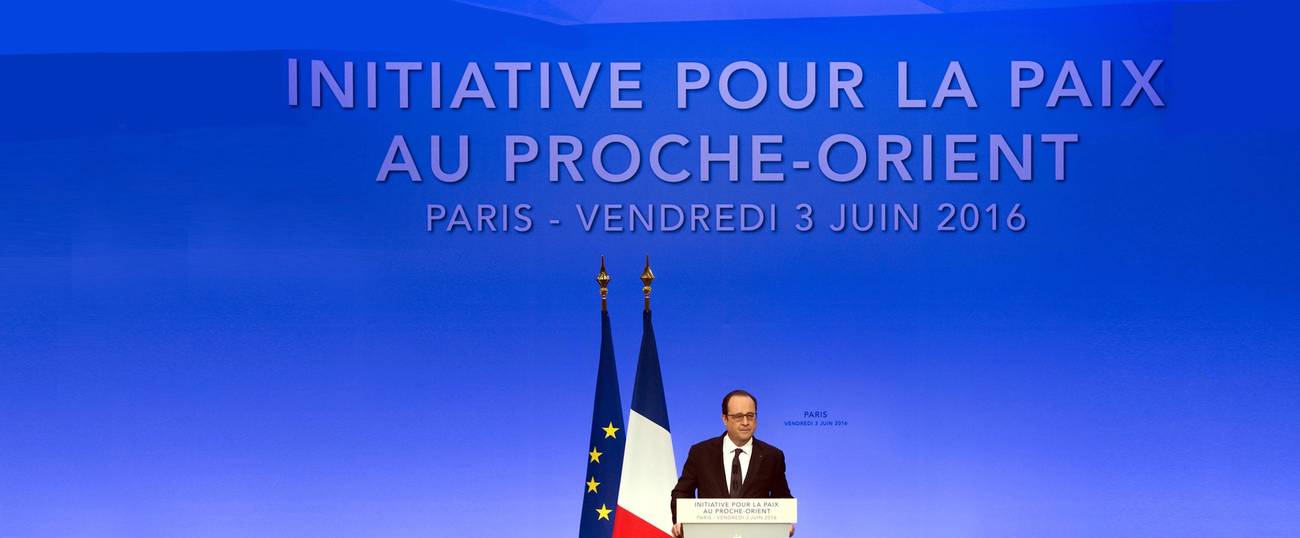How Is the Paris Peace Conference Different From All Other Peace Conferences?
The Obama Administration shifts away from the bilateral model that has characterized American brokerage of the process since the 1990s




After being announced by France’s then-Foreign Minister Laurent Fabius with great fanfare in January, followed by a dramatic months-long wind up (with a delay to allow for the participation of U.S. Secretary of State John Kerry), Friday’s Israel-Palestine peace conference in Paris ended with a fizzle—a solemn restatement of international commitments to ending the occupation that began in 1967 and to creating a Palestinian state. In today’s environment, that ho-hum result qualifies as a positive outcome.
It’s reasonable to ask what the Paris conference hoped to achieve; indeed why, given the many and varied crises gripping the Middle East, it was ever convened in the first place. There are a few answers. One is politics. Just as the American approach to Israel-Palestine is driven in part by domestic concerns, so is France’s. An increasingly vocal and engaged French Muslim population considers the Palestinian issue important, and French politicians are responding.
As with American leaders, there’s the issue of global leadership and legacy. Achieving Israeli-Palestinian peace remains the brass ring of international diplomacy, seeming—tantalizingly—just out of reach.
There’s also genuine strategic significance in the prospect of resolving an issue of such longstanding regional concern, one that, like it or not, continues to color opinions of Europe and the United States and that radicals and extremists have turned to repeatedly in their recruitment pitches. (It shouldn’t have been surprising when, after experiencing a series of embarrassing battlefield setbacks in December, ISIS head Abu Bakr al-Baghdadi sought re-accreditation by invoking the Palestinian cause.)
While the final communiqué was unspectacular, it’s worth recognizing that the multilateral nature of the conference itself is a Palestinian strategic victory, marking another step toward the internationalization of the peace process. This is something the Palestinian leadership has long sought, seeing more advantage in a process less dominated by Israel’s main patron, the United States. Israel has opposed internationalization for precisely the same reason, preferring to focus its efforts on influencing one mediator rather than many.
Israeli government officials have repeatedly insisted that the conference would produce nothing and that the only way to make progress is through the continuation of direct bilateral talks (a context in which they enjoy a clear advantage, as the stronger party). Netanyahu claimed last week that the conference would undermine the possibility of peace and “radicalize Palestinian demands.”
It’s worth pausing for a moment to consider this remark. In 1993, the Palestinians made what they see as a historic concession, indeed the single biggest concession that either party has made or will be asked to make in this conflict: recognizing the State of Israel, relinquishing their claim to all of historic Palestine, and accepting a state in the remaining 22 percent—East Jerusalem, the West Bank, and Gaza. Two decades later, Netanyahu’s position is that Palestinians demanding the whole 22 percent is unreasonable.
The multilateral nature of the conference is a Palestinian strategic victory, marking another step toward the internationalization of the peace process.
Israeli intransigence, in combination with lingering frustration at Palestinian President Mahmoud Abbas’ perceived refusal to engage on U.S. proposals back in March 2014, has caused the Obama Administration to make a significant analytical shift toward options other than the bilateral model that has characterized American brokerage of the process since the 1990s. The premise used to be that, if you just got Israelis and Palestinians around a table, with the right inducements, they could reach an agreement. For the time being at least, that’s clearly not happening. Asked recently about Netanyahu’s offers to negotiate, a State Department official responded, in so many words, “About what?”
Going into the conference, the French government had three main goals: to reaffirm the international commitment to the two-state solution as the only viable one to the conflict; to assemble body of relevant documents outlining the basic principles and resolutions underlying a final resolution (while being very careful not to refer to these as “parameters”); to develop a set of follow-up instruments, committees, and working groups to monitor progress. While the first two are laudable if unimpressive goals, it’s the third that really mattered. And that’s where the conference came up notably short.
“The French initiative suggested that some important international actors at least are ready to move beyond the meaningless and futile exercise of focusing exclusively on the resumption of bilateral negotiations between two such unequal parties,” said Daniel Levy, a former Israeli negotiator and now head of the Middle East and North Africa program at the European Council on Foreign Relations.
However the closing communiqué of the conference suggests that the French still have a significant distance to travel if this initiative is going to learn from and address the structural flaws that have guaranteed failure in previous international efforts, in particular disincentives will have to feature in the toolkit and be used in relation to the stronger and recalcitrant party, the occupying power Israel, and there will have to be a willingness to clearly establish terms of reference for any future process and to hold parties accountable for both foot dragging and ongoing actions that are not only unhelpful but also in violation of international law, especially settlements.
This is the key question bedeviling the conference and any followup efforts: How is this peace process different? It’s fine to reaffirm the international consensus behind the two-state solution and warn against steps that undermine it, but without the serious prospect of consequences for those violations, it’s difficult to see how any improvement in the negotiating environment—an ostensible goal of this effort—will be achieved. The Palestinians scored a victory by moving the process into a potentially more favorable venue, which the Israelis will continue to oppose. But the outcome from Friday suggests that Israel may not have much to fear from a planned second round of French-brokered talks in the fall.
***
Like this article? Sign up for our Daily Digest to get Tablet Magazine’s new content in your inbox each morning.
Matthew Duss is president of the Foundation for Middle East Peace, based in Washington, DC.